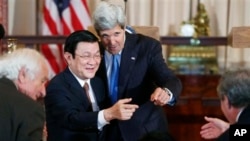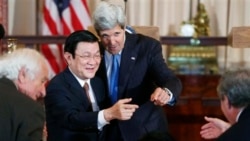“Forty-five years ago, hundreds of thousands of Americans were fighting in the fields and rivers of Vietnam. Today, hundreds of thousands of us are visiting [Vietnam’s] marketplaces and historic sites,” U.S. Secretary of State John Kerry said at a working lunch with visiting Vietnamese President Truong Tan Sang in Washington, DC. “We have come a long way . . . [and] we will continue to grow our relationship in the years ahead.”
The United States normalized relations with Vietnam on July 11th, 1995.
“Today, when Americans hear the word Vietnam, they are able to think of a country, not a war. And that is our shared accomplishment,” Secretary Kerry said. “Vietnam has emerged as one of Asia’s great success stories. Thanks to our landmark bilateral trade agreement in 2001, two-way trade from 1995 to today has increased more than 50-fold. Per capita, incomes in Vietnam have increased almost 500 percent. . . . We are now working to conclude an historic Trans-Pacific Partnership, a high-standard 21st century trade agreement that will promote regional economic integration, prosperity, and opportunity for the people of all of the member countries.”
“As Vietnam has transformed itself, the country is now placing an increasingly significant role on regional and on global issues,” Secretary Kerry continued. “We welcome Vietnam’s announcement that it intends to participate in UN peacekeeping operations in 2014. . . . We are cooperating to promote maritime security and to improve our humanitarian assistance and disaster relief capabilities. We are focusing our assistance programs on adaptation, clean energy, sustainable development . . . to address Vietnam’s vulnerability to climate change, and just recently . . . we talked about [how to cooperate on] the Lower Mekong Initiative.”
“As we look ahead to the future of U.S.-Vietnam relations, we should remember that normalization could not have occurred without honest conversation . . . even on sensitive issues such as human rights,” Secretary Kerry said in conclusion. “I am committed to building on this kind of frank and cooperative partnership that is essential to both of our countries.”
The United States normalized relations with Vietnam on July 11th, 1995.
“Today, when Americans hear the word Vietnam, they are able to think of a country, not a war. And that is our shared accomplishment,” Secretary Kerry said. “Vietnam has emerged as one of Asia’s great success stories. Thanks to our landmark bilateral trade agreement in 2001, two-way trade from 1995 to today has increased more than 50-fold. Per capita, incomes in Vietnam have increased almost 500 percent. . . . We are now working to conclude an historic Trans-Pacific Partnership, a high-standard 21st century trade agreement that will promote regional economic integration, prosperity, and opportunity for the people of all of the member countries.”
“As Vietnam has transformed itself, the country is now placing an increasingly significant role on regional and on global issues,” Secretary Kerry continued. “We welcome Vietnam’s announcement that it intends to participate in UN peacekeeping operations in 2014. . . . We are cooperating to promote maritime security and to improve our humanitarian assistance and disaster relief capabilities. We are focusing our assistance programs on adaptation, clean energy, sustainable development . . . to address Vietnam’s vulnerability to climate change, and just recently . . . we talked about [how to cooperate on] the Lower Mekong Initiative.”
“As we look ahead to the future of U.S.-Vietnam relations, we should remember that normalization could not have occurred without honest conversation . . . even on sensitive issues such as human rights,” Secretary Kerry said in conclusion. “I am committed to building on this kind of frank and cooperative partnership that is essential to both of our countries.”






